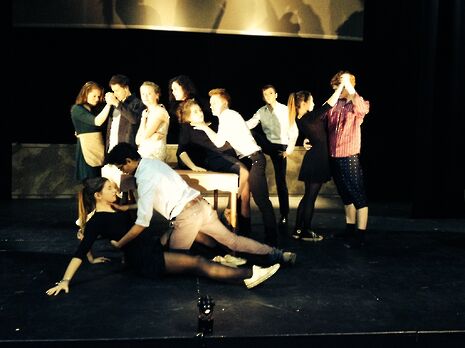Theatre: The Penelopiad
Alexandra Logan is impressed by this ADC Freshers’ play which shines the spotlight on the women in Homer’s Odyssey

Margaret Atwood's The Penelopiad retells Homer's Odyssey from the point of view of Odysseus' wife. The novella gives a voice to the females in the epic, specifically Penelope and her maids, finally bringing to the limelight those women who in the Odyssey are so often kept in the shadows. Against this backdrop of Homer and of Atwood, the ADC Freshers' Lateshow succeeds in bringing to life this new twist on an ancient tale.
The first thing to strike me was the set. The action does not rely on elaborate staging, but revolves around key props, on a mostly bare stage. A platform, table and chairs evoke banqueting halls, a bedroom, a ship; clever manipulation of space goes hand in hand with de Ferrer's use of physical theatre and dance, as the minimalism of the staging allows movement and words to remain at the forefront.
The scene changes were mostly smooth (any teething problems ought to disappear), with some more effectively than others capturing the feel of book chapters, so that the idea of turning pages and progressing through a novel did not stray far from my mind. That is not to say that the show feels clumsy. The various elements are well-integrated; scenes flow from witty prose and dialogue into choreographed pieces to mesh soundly as whole. Atwood's melding of ancient and modern is assisted in de Ferrer's interpretation through music, with contemporary tracks (notably in a delicate love scene between Penelope and Odysseus, and in a frenetic and moving rape scene set to a tango) and choral singing.
The Penelopiad showcases promising new talent. Particularly impressive is Aoife Kennan as Penelope, an almost constant presence onstage. She not only coped with this pressure, but shone, rising to the challenge of conveying the complexities of her character with nuanced and powerful acting. The male chorus provides many of the lighter moments, with their depiction of the suitors reminiscent of drinking societies, but the female chorus is a real highlight. The perspectives of these six handmaids, whose massacre in the Odyssey receives only a slight mention, are convincingly voiced. By turns eerie, threatening, wrathful, seductive and vulnerable, the chorus achieves the difficult task of presenting a united front, representative of a silenced womankind, yet remaining distinct and interesting to watch in their scenes of physical theatre.
The play is an impressive take on ancient themes. The combination of music, song, dance and physical theatre offset the prose, giving a voice to women, which is not silenced but rather screams out at the audience.
 Comment / Plastic pubs: the problem with Cambridge alehouses 5 January 2026
Comment / Plastic pubs: the problem with Cambridge alehouses 5 January 2026 News / Uni-linked firms rank among Cambridgeshire’s largest7 January 2026
News / Uni-linked firms rank among Cambridgeshire’s largest7 January 2026 News / New movement ‘Cambridge is Chopped’ launched to fight against hate crime7 January 2026
News / New movement ‘Cambridge is Chopped’ launched to fight against hate crime7 January 2026 News / SU stops offering student discounts8 January 2026
News / SU stops offering student discounts8 January 2026 News / Cambridge businesses concerned infrastructure delays will hurt growth5 January 2026
News / Cambridge businesses concerned infrastructure delays will hurt growth5 January 2026








